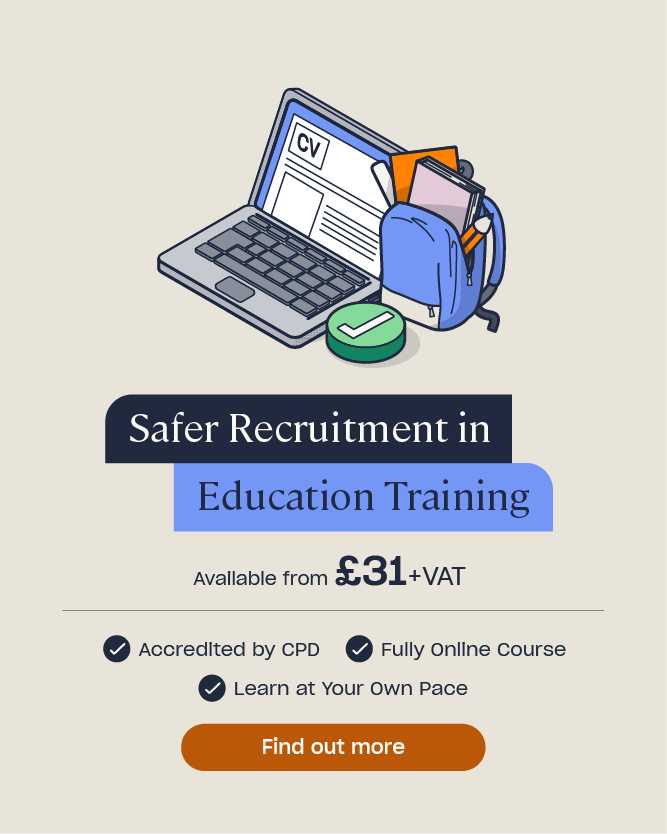Safeguarding Interview Questions for School Teachers
If your job role requires you to recruit new employees or volunteers for your educational setting then it’s clear that you’ll want to hire the best people for the job. You’re aiming to source, interview and hire candidates who will make a positive difference to your children’s lives and support the safeguarding values of your organisation – but how can you ensure this is the case?
Every school should follow a strict safer recruitment process to make sure that the people hired are suitable for the role and suitable to work with children.
All professionals have a duty to keep children safe from harm, and safer recruitment practices play a significant role in your setting’s safeguarding children process.
A key part of safer recruitment is ensuring that you use the right kind of interview questions, so let’s take a look at what you should ask applicants to guarantee a successful interview that keeps safeguarding at the forefront.
What Type of Interview Questions Should I Ask?
Asking candidates the right type of questions is essential if you want your interviews to be a success. Not only are you looking to assess a candidate’s skills and expertise, but you’re also aiming to assess their suitability for the role in your school as well as their attitude towards safeguarding children.
The questions you ask in an interview need to be:
- Relevant to the job role.
- The same for each candidate that you interview.
- ‘Open’, in order to prompt a detailed response.
‘Open’ questions usually feature the words ‘who’, ‘what’, ‘where’, ‘when’, ‘why’ or ‘how’ and prompt the candidate to give you a full, detailed answer. These are preferable over ‘closed questions’ which limit the response from the candidate and often just ask for a yes/no answer.

If you ask a question and the candidate doesn’t respond with enough detail then don’t be afraid to ask further questions to prompt them to reveal more. It’s important that you leave the interview with all of the information that you need so you can make a well-informed decision.
Towards the end of the interview you could also ask a few questions about the candidate’s hobbies and interests to help you get a more rounded opinion of their character. You shouldn’t rely on this type of question but they can aid you in developing a clearer picture of the candidate’s attitudes and motivations.
Why Are Safeguarding Interview Questions Necessary?
Holding an interview for each candidate gives you a great opportunity to assess their attitudes, values and motivations in a face-to-face situation. You’ll be able to see whether the candidate’s words and behaviour match up to what they have previously written in their application form, and gain responses that reveal more about their suitability for the role.
Assessing a candidate’s attitude towards safeguarding children is essential for anyone working in a school environment. Remember that you’re looking to hire employees and volunteers who are suitable for both the role and the setting and who can demonstrate a positive attitude towards child welfare.
Need a Training Course?
Our Safer Recruitment in Education Training aims to help you understand what’s involved in the process from start to finish, looking at how to create an applicant information pack, how to interview candidates, how to carry out pre-appointment checks and how to ensure you’re doing all that you can to find the right person for the job role.
Using suitable interview questions, your aim should be to:
- Encourage the candidate to talk about their personal experiences in regards to working with children.
- Ask the candidate to provide real-life examples that prove they have always taken child protection seriously.
- Clarify any discrepancies or concerns you have from the candidate’s application form.
- Ask the candidate if they wish to declare anything that they haven’t already disclosed to you.
- Remind the candidate that you take safeguarding seriously and will be following up the interview with a Disclosure and Barring Service (DBS) check.
Be sure to make a written record of what the candidate says, plus details of any other relevant observations or issues, so that you have something to refer back to later.

Example Safeguarding Interview Questions
To assess a candidate’s attitude towards safeguarding, you should look to ask them questions which provoke a response relating to their personal experiences.
‘Open’ questions which prompt a detailed response or discussion are the most effective for this. You can use open questions to find out how the candidate has acted in the past or what their attitude is towards safeguarding procedures.
For example:
- “Can you tell me about a time when you had to control a child’s behaviour?”
- “What is your favourite teaching method and why did you choose it?”
- “What do you do to ensure that every child in your class reaches their potential?”
- “When was the last time you had to discipline a child?”
- “What is your opinion on doing yearly safeguarding children training?”
‘Closed’ questions, on the other hand, are less useful to you as they only require a minimal answer. For example, in response to “Have you ever disciplined a child?” the candidate may simply say “No I haven’t” and provide you with no valuable information.

You should also avoid ‘leading’ questions which suggest the answer you want the candidate to give.
For example, saying “Why did you not take your safeguarding training this year?” sounds like you’re accusing the candidate and are trying to get them to admit to something that may or may not be true.
Instead, phrase this question more openly so that the candidate can respond with more detail. For example: “When did you last undertake safeguarding training?”
Unlike the first example, this question doesn’t suggest that the candidate chose to not complete their training.
Further Resources:
- Regulatory Requirements for Designated School Safeguarding Officers
- Guide to Safeguarding Children Legislation
- Safer Recruitment in Education – An Online Course
- Safeguarding Responsibilities of School Staff











